Keystone Fight Renewed
Air Date: Week of April 7, 2017

The Nebraska Sandhills, the largest sand dune formation in America, seen from NASA’s Terra spacecraft. The Sandhills and the underlying Ogalla aquifer could be impacted by a potential heavy crude oil spill. (Photo: NASA/GSFC/METI/ERSDAC/JAROS, and U.S./Japan ASTER Science Team)
Fulfilling a campaign promise, President Trump’s State Department has approved completion of the Keystone XL pipeline. But pipeline builder TransCanada still faces significant hurdles in federal court and in the state of Nebraska. Jane Kleeb ,founder and President of Bold Alliance|Bold Nebraska, tells host Steve Curwood how worries about water safety have caused many citizens, farmers, ranchers, and Native American tribes to unite to oppose the pipeline’s route through Nebraska’s sensitive Sandhills area.
Transcript
CURWOOD: From PRI and the Jennifer and Ted Stanley studios at University of Massachusetts, Boston, this is Living on Earth. I’m Steve Curwood.
Thanks to President Trump, TransCanada may soon proceed with the controversial Keystone XL pipeline, designed to link Alberta’s tar sands with Texas oil refineries. President Obama rejected the pipeline on grounds it would aggravate global warming, but the Trump State Department overturned that ruling. Groups including the Natural Resources Defense Council, Center for Biological Diversity and Bold Alliance have sued, alleging that move violated the law. TransCanada also needs a permit from the State of Nebraska, but activists there say the pipeline would be harmful to Native American communities and would threaten the Sandhills ecosystem. This is a fragile part of the prairie where water recharges the massive Ogallala aquifer which stretches from West Texas to South Dakota, and serves 30 percent of irrigated crops in the US. Jane Kleeb is the president of Bold Alliance/Bold Nebraska. Jane, welcome to Living on Earth!
KLEEB: It's always good to be with you.
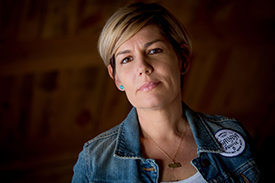
Jane Kleeb (Photo: Mary Anne Andrei / Bold Nebraska)
CURWOOD: First, Jane, to what extent did you and your fellow opponents of the pipeline see this approval coming?
KLEEB: We knew from the campaign trail that President Trump would eventually approve the federal permit for Keystone XL. You know, despite him saying that he was going to require TransCanada to use 100 percent American made steel which Keystone does not use - It's actually 70 percent foreign steel - but we figured he would find a way to wiggle out of that and approve the pipeline, and that's exactly what he did for the federal level.
CURWOOD: And how do you feel about that?
KLEEB: You know, it's frustrating because we think that President Trump is completely ignorant about what is happening here on the ground. He's never talked to a single one of us, and he prides himself on being in touch with rural voters and standing up for world people, and yet he's throwing us completely under the bus.
CURWOOD: Jane, take a moment for us, please, to explain why this State Department permit doesn't seal the deal for Keystone XL and why the Nebraska is the next hurdle that TransCanada must get over.
KLEEB: You know, the great news is, is that in our country we still have something called states’ rights, and for oil pipelines they are permitted at the state level. And so TransCanada still has to get a state permit to cross into our state for the Keystone XL route. It's a very vigorous process. It'll actually be the first time that the public service commission reviews an oil pipeline route in Nebraska. It's no surprise probably to listeners that we're an ag state and not an oil state. We have a lot of corn and cattle, not a lot of oil pipelines. No one really knows how it's going to end because the PSC has never really had to do this before.
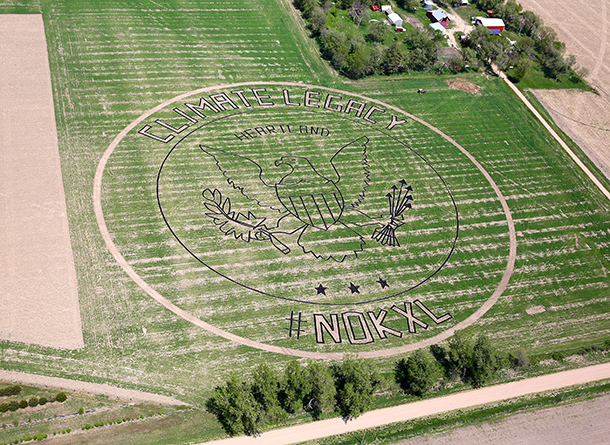
Bold Nebraska used large-scale crop designs as part of their efforts to persuade former President Obama to reject the pipeline. He did so on November 6th, 2015. (Photo: Dakota Aerials / Bold Nebraska)
CURWOOD: And just to remind people about our unusual Nebraska politics are, you have just one house for your legislature, the unicameral, as you call it, and people aren't elected to that by political party, but they are apparently to this Public Service Commission.
KLEEB: Yeah, so Nebraska is so interesting. You know, I often try to remind people that, you know, we have not only this nonpartisan unicameral where there's no party identification on the ballot, but we have 100 percent public power, so we don't have any private utilities in our state. It's all run at the very local level with boards that you can run on as a citizen. We're a very populist, independent, local-control state. That is the lifeblood of the backbone of our politics. So, this is going to be interesting, right? Because it is a partisan body at the public service level.
CURWOOD: Talk to me about the membership of the Public Service Commission. They’re the ones that need to approve this. Who are these folks, and what kinds of indications have they given so far?
KLEEB: So, there's five commissioners. There's only one Democrat, but the two commissioners that represent a lot of the counties along the proposed route are very independent. One in particular, Mary Riddle, is a rancher, is a very strong independent voice, and so we're going to make our case directly to them, following the rules that they set out, which TransCanada has the burden of proof through this process to prove that this is in the public interest of Nebraska. So we think that we can clearly show that this threatens our water, threatens livelihoods, and takes away property rights.
CURWOOD: Now, when the state department approval was announced, President Trump said he’d call Nebraska’s governor, make sure that he'd approve the pipeline route to the state, but how much power does Nebraska's governor have in that decision? You have the Public Service Commission, right?
KLEEB: Yes, so Governor Ricketts has absolutely no say in the pipeline route decision. So President Trump can call Ricketts anytime he wants. They can even go to a Cubs game, which is what the Ricketts family owns. They have lots of money, and TD Ameritrade is actually one of the big banks that is financing the Keystone XL Pipeline. So, Ricketts clearly supports the pipeline, but ranchers and farmers who elect a lot of Republicans in our state are firmly opposed to this pipeline because of the eminent domain and because of water. So thankfully Ricketts does not have a say in the decision.
CURWOOD: So, what could the federal government do anything to override the Nebraska Public Service Commission, should it decide that Keystone XL is not in the best interest of “huskers,” you call yourselves?
KLEEB: Yes! You know, so the huskers are keeping an eye on Congress. We do know that Congress could attempt to override state rights. We think that that obviously would set a very dangerous precedent for Republicans, to be overriding state rights, but we know that that is a possibility that they could do. Our state legislature could also attempt to undo the powers of the Public Service Commission when it comes to pipelines, although I don't think they will do that. They actually tried that before, when we had a different governor, and that landed the unicameral and the Governor in court, and landowners won in that case. I'm not sure they'll try that again, but I don't put anything past Governor Ricketts and Trump with their desire to get this pipeline in the ground. I think one of the possible outcomes that could happen in the law that got passed was, they have to consider an existing corridor, and TransCanada has an existing corridor in our state. They have Keystone 1 pipeline that went into the ground under George Bush in 2008. So, the outcome of this could be, no new land taken out of production, eminent domain is not used, the Ogallala aquifer not at risk, but TransCanada still gets a second pipe, but they have to be forced to put it next to Keystone 1.
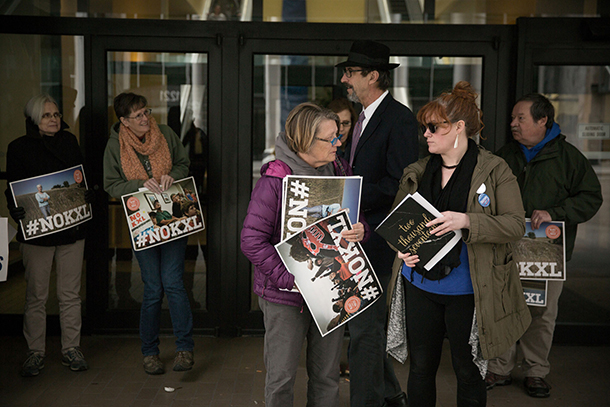
At a Bold Nebraska rally on March 22nd, 2017, landowners and citizens gathered at the Public Service Commission office in Lincoln, Nebraska to deliver their intervenor applications (Photo: Marty Steinhausen / Bold Nebraska)
CURWOOD: So, tell me about this route that TransCanada wants now, compared to this existing route that they already have a pipeline on.
KLEEB: You know, the current route that they're proposing, that's on the table for the Public Service Commission to review, cuts right through the Sandhills which is a very fragile, sensitive soil in our state and where the vast majority of cattle producers are because that's also where the Ogallala Aquifer recharge zones are, meaning the aquifer is very close to the surface, and all of our drinking water supplies really come from the aquifer, and it's only possible because the Sandhills essentially act like a big sponge and replenishes the aquifer in those recharge zones. So, it's like the worst possible place you could be putting a maximum-pressure, maximum-capacity tar sands pipeline because we know, when tar sands hits water, it's very difficult, if not impossible, to clean up. It's very different than traditional oil because it's heavier and has lots of chemicals. It sinks. So, we are really arguing that it is not in the public interest to shove that pipe through the Sandhills and the aquifer and that, if it gets approved at all, it should be definitely forced to go to next to their Keystone 1 route which is on the eastern part of our state, away from sensitive soils.
CURWOOD: How does your organization feel about it getting approved at all? In your view, how positive would it be to have a Keystone XL, if it ran, say, at the eastern end of your state, not risking the water?
KLEEB: You know, our major concerns always with Keystone have been the risks to water and property rights of farmers and ranchers. You know, we don't believe that eminent domain should be used for private gain, especially a foreign owned corporation. But we also acknowledge and have from day one way the risks of tar sands and climate change. This pipeline would open up a huge superhighway to export tar sands to the export market.
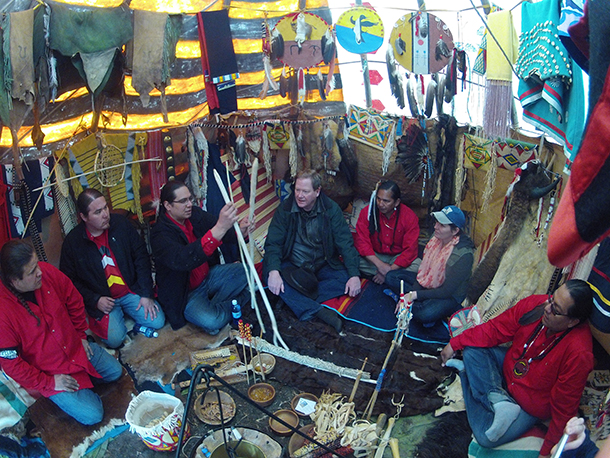
Members of the Rosebud Sioux Tribe and guests gathered at the prayer camp to oppose Keystone XL, in March 2014. Native American tribes in Nebraska are once again gearing up for a fight against the pipeline’s route through their sacred sites. (Photo: Matt Sloan / Bold Nebraska)
This is not about, you know, providing tar sands to America. We don't use tar sands. It's a much heavier form of oil, and we have enough oil with the Bakken oil fields in North Dakota. So, this is really about Canada being in a very difficult spot. They don't have export-market capability where they are right now. The tar sands are landlocked, and going through the United States was the best way for them to get this stuff on the export market to make lots of money. We don't think our property rights and our water and our climate should be put at risk so Canada can make a bunch of money.
CURWOOD: Jane, take a moment to tell us about the Native American tribes there. Which ones have a stake in this, and what are they doing in opposition to Keystone XL?
KLEEB: The tribes are a critical part of our alliance. You know, we do lots of actions with the tribes. We call ourselves the Cowboy and Indian Alliance when we do actions together, and so, I think, you know, sometimes people look at the movies and think that folks in kind of the rural areas are at odds with tribes, when in fact in our state and in South Dakota, the ranchers and the tribes really did work hand-in-hand, especially in the early days, and now we see everything is at stake - our water, our livelihoods, their sacred burial grounds along the route. And in particular for Nebraska, the Ponca Trail of Tears is directly crossed and threatened by this pipeline.
So, for the past four years, we've worked with the Ponca tribe, and we've planted their Ponca Sacred Corn inside the route as medicine. It's now certified by the USDA as Ponca Sacred Corn, and so we think that we have lots of actions like that, that we will continue to lift up, not only to bring people together but if we need to file a court challenge to protect that Ponca Sacred Corn, we will do that as well.
CURWOOD: So, cowboy or Indian, you're all cornhuskers, huh?
KLEEB: [LAUGHS] That's right, that’s right. We all wear Wranglers and we all wear boots.
CURWOOD: So, what do you understand the Native American tribes are going to do in response? There's the courtroom and the encampments that we saw at the Dakota Access Pipeline protests.
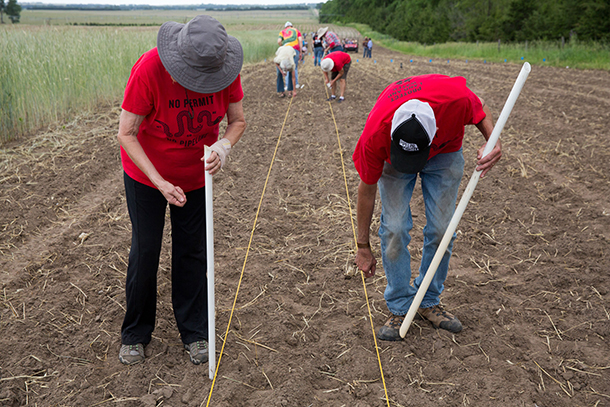
Volunteers with Bold Nebraska plant Ponca sacred corn along the proposed Keystone XL pipeline route (Photo: Mary Anne Andrei / Bold Nebraska)
KLEEB: Yes, so the Rosebud Sioux tribe has already set up their Spirit Camp, and they had a Spirit Camp on Keystone XL route the last time we fought it, and it was really a center point for people to pray, and they have 12 teepees up, and they’ll continue to hold that encampment, and people will come in and out of that encampment. And then we do know that the Ponca and the Winnebago and Pawnee and the Omaha here in Nebraska are also going to be very engaged in the Public Service Commission level as well as actions.
You know, we have some creative actions planned for inside the route. Just to give you a example, like, we built a solar barn inside the Keystone XL route last time around because TransCanada's contracts say that you can't have any permanent structures inside. So, that was us and the tribes' message to the president saying, “You’d have to tear down clean energy and a symbol of our livelihoods in order for this dirty pipeline to go in”. So, you know, we work hand-in-hand with the tribes, and I think that's one of the things that actually terrifies companies like TransCanada is that there's no dividing us. Whether it's the tribes in the United States, the First Nations in Canada, the farmers, the ranchers, and our tree huggers, we are a united front.
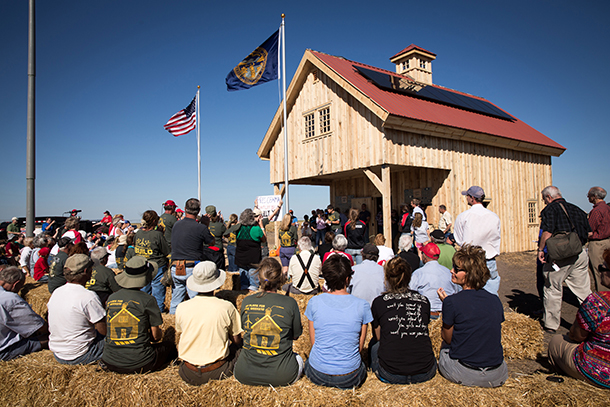
Bold Nebraska built a “solar barn” in the proposed pipeline path to send a message that building the pipeline would be a choice to tear down renewable energy and a symbol of Nebraska economy. (Photo: Mary Anne Andrei / Bold Nebraska)
CURWOOD: Jane Kleeb is the Founder and President of Bold Alliance/Bold Nebraska. Jane, thanks so much for taking the time with me today.
KLEEB: Thanks for visiting with us.
Links
Lincoln Journal Star: “PSC approves nearly all petitions for KXL intervener status”
The Nebraska Public Service Commission’s oil pipeline approval process
CNN: “Trump administration approves Keystone XL pipeline”
The Hill: “Green groups sue Trump over Keystone XL approval”
Living on Earth wants to hear from you!
Living on Earth
62 Calef Highway, Suite 212
Lee, NH 03861
Telephone: 617-287-4121
E-mail: comments@loe.org
Newsletter [Click here]
Donate to Living on Earth!
Living on Earth is an independent media program and relies entirely on contributions from listeners and institutions supporting public service. Please donate now to preserve an independent environmental voice.
NewsletterLiving on Earth offers a weekly delivery of the show's rundown to your mailbox. Sign up for our newsletter today!
 Sailors For The Sea: Be the change you want to sea.
Sailors For The Sea: Be the change you want to sea.
 The Grantham Foundation for the Protection of the Environment: Committed to protecting and improving the health of the global environment.
The Grantham Foundation for the Protection of the Environment: Committed to protecting and improving the health of the global environment.
 Contribute to Living on Earth and receive, as our gift to you, an archival print of one of Mark Seth Lender's extraordinary wildlife photographs. Follow the link to see Mark's current collection of photographs.
Contribute to Living on Earth and receive, as our gift to you, an archival print of one of Mark Seth Lender's extraordinary wildlife photographs. Follow the link to see Mark's current collection of photographs.
 Buy a signed copy of Mark Seth Lender's book Smeagull the Seagull & support Living on Earth
Buy a signed copy of Mark Seth Lender's book Smeagull the Seagull & support Living on Earth

